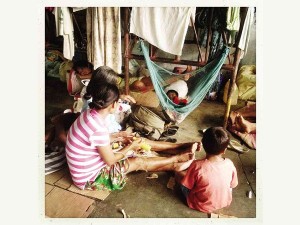Agusan folk caught in the crossfire
DAVAO CITY—Twenty-eight-year-old Linda Andalique was counting the days before she gives birth to her fourth child when she and her family were forced to leave their home in the town of Loreto in Agusan del Sur after government soldiers allegedly massed up in their village and harassed residents.
“Leaving your home with only a bundle of clothes, a few kilograms of rice and holding three kids is very hard,” she said.
“We walked for at least three hours. My stomach is heavy and I was afraid that I would give birth during our trek. The children were crying because they were hungry and thirsty. Evacuation is hell but we have to do this for our survival,” Andalique said.
At least 500 residents, mostly from the Agusanon Manobo tribe, from the villages of Kauswagan, Sabod and San Mariano took temporary shelter at Kauswagan Elementary School on July 24 after soldiers allegedly conducted house searches, arrests and harassed residents in the area.
The soldiers were deployed to Barangay Kauswagan after village chief Ramon Diaganonon was killed by suspected members of the New People’s Army last July 19.
Article continues after this advertisementThe next day, four boys, including a 16-year-old and a 17-year-old, who were said to be on their way to the voter’s registration for the Sangguniang Kabataan elections, were accosted by the military along the highway in the same village.
Article continues after this advertisementThe minors were detained and are now under the custody of the Loreto Social Welfare Department, facing murder charges.
The families of the arrested said the boys were tortured.
To seek the help of the provincial government, the residents went to Prosperidad town, the provincial capital, on Aug. 2.
Four days later, aboard trucks, the evacuees arrived in Davao City, more than 200 kilometers away, saying they failed to get the support of their provincial government.
An agreement signed by representatives of the evacuees, the municipal and provincial governments and the military said that all parties would work together to ensure the affected residents would be able to return to their homes safely.
“But we were shocked when our governor sent in vehicles from the provincial government and the Philippine National Police that would immediately take us home. The fighting between soldiers and the NPA was still ongoing and they would already take us home? Then the purpose of our evacuation would be defeated. It was like bringing us to our deaths,” evacuee Marilyn Egdames said.
The residents said the act of the provincial government led to a deadlock in the negotiations, prompting them to decide to proceed to Davao City, which they believed could provide them temporary sanctuary.
“It was as if they could not wait to throw us out of the evacuation center. We explained that it was dangerous for everyone to return because the clashes had not ceased and the military remained in the area,” Egdames said.
Maj. Leo Bongosia, spokesperson of the military’s 4th Infantry Division, said militant groups, like Karapatan, were influencing the residents to call for the military’s pullout from the area.
Bongosia said the militants were afraid to lose ground if the military stayed in the area, bringing social services to the people.
He denied allegations the soldiers committed human rights violations in Kauswagan.
“Troops were not deployed to those areas looking for NPA rebels, but were instead looking for issues and problems that communities may have. The military’s task there was to gather these issues and problems and present these to concerned agencies. Through Oplan Bayanihan, the military is now part of our government’s whole-nation effort in resolving the basic problems of the community,” Bongosia said.
He said the house-to-house visits were part of what he described as needs assessment and the questions that soldiers asked were purely about social and economic problems in the village.
Andalique disagreed. “They went to our house heavily armed and repeatedly asked us about the location of the NPA. What should we tell them? Yes, we can see them from time to time because we live in the mountains, but how can we explain their location when the NPA is always moving and walking?” Andalique said.
“This was when the soldiers got frustrated and shouted at us. They told us that if they got ambushed they would come back at us and take their revenge,” Andalique added.
The residents said some of the tribal people who were recruited as government militias, called Bagani Force, sharpened their machetes in front of the residents to scare them.
“We did not evacuate during the devastation of Typhoon ‘Pablo.’ We thought we were already starting to stand on our feet after we rehabilitated our farmlands that were damaged by Pablo. But this time, we were forced to leave our homes. Militarization is worse than Pablo,” Andalique said.
But Bongosia insisted that all these allegations are propaganda of human rights organization Karapatan.
“What will the children at the evacuation centers eat? I pity the affected residents who believe and agree to the efforts and goals of the AFP and are already yearning to go back to their homes,” Bongosia added.
For Andalique, however, the decision to leave their village and stay in the evacuation center until the military pulls out was theirs.
“We will stay and sleep at the cold floor of this gym in Davao City. I will wait and welcome the birth of my daughter. She will see the world in a different and harsh way. But we will strive hard so that the next generations will not experience evacuations again,” Andalique said.
